With a boyish charm and subtle humor coming across the cell waves, our conversation began with, “well that’s what people call me,” when I asked if I could call him G.R. I could imagine that being said with a slight inner chuckle. His politeness and gentle verbal demeanor quickly gave me an understanding of how he has become the greatest jockey in quarter horse racing history. Any animal lover knows that animals can sense who we are, size us up if you will. It was apparent already that every horse he rode during his career must have felt the same humility and gentle nature I felt in his words. As a result, every one of those powerful creatures gave it their all for him each time they bolted from the starting gate.
Carter is one of those rare individuals who seem to be guided through life with a specific destiny. His stature, upbringing, and interests all seemed to be leading to a destination that he had not even considered while growing up in Pawhuska.
My Heroes Have Always Been Cowboys
“Growing up, my heroes were cowboys…steer ropers, calf ropers…and that led me to junior rodeos.” His father George, a horseman and talented steer roper on the rodeo circuit, his great-uncle Barton Carter was the championship roper of the world in 1925 and his grandfather Alva “Red” Carter did trick riding in silent movies and raised horses for Hollywood. This was the stock from whence the future jockey was born. But it would not be a career as racehorse jockey for which he initially aspired. While still a teen, Carter wanted to study animal sciences. His first encounter with a racehorse came in 1982 the summer after 8th grade at the fairgrounds at Osage Downs. He “galloped” horses for the trainers who trained the horses before they were sent away to tracks elsewhere.
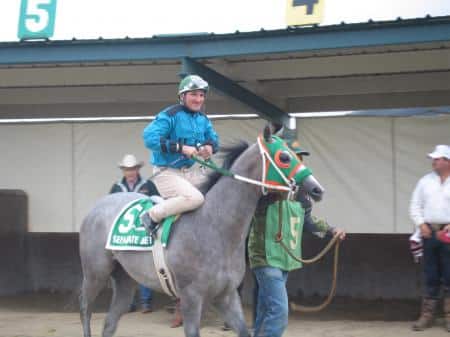
By Gambrusky at en.wikipedia
“I had no idea at that time where horse racing would end up taking me,” Carter said. And it took him to the pages of horse racing
history over the next three decades. Although he would go on to participate in amateur races during his early years of high school, he still planned on attending OSU and eventually entering their veterinarian program. That all changed by his senior year. He had begun competing and winning money and knew that being a jockey was the track in life he needed to ride.
“I like to tell people that I went to college at Blue Ribbon Downs,” he quipped followed by a boisterous chuckle. He had been doing well on the racing circuit in high school having had his license to ride official races since he was 16 years old. Although it was not the big-time circuit that he would eventually enter, he had already found a level of success in doing what he loved. Upon graduation, he moved to the big leagues with a fervent tenacity that would lead him to compete on average over 1,000 races per year for the next 30 years. That’s over 30,000 official races. This doesn’t include galloping to help the trainers, brush races or training races, Carter said.
Horse Racing 101
Just how does one get to compete in so many races? Surely there are several jockeys and not all of them can be chosen to ride. Carter explained that image is very important, but he believes his key to having so many opportunities was his willingness to work with the trainers. Carter didn’t just show up at race time. Instead, he would go to the track in the mornings and work with the trainers. This is not something jockeys get paid for but opt to do to help the trainers. He added that the owners listen to the trainers and building relationships with these trainers afforded him more opportunities to race. Of course, winning races also provided more opportunities as well. As Carter said, “winning snowballs into more success and image is everything”.
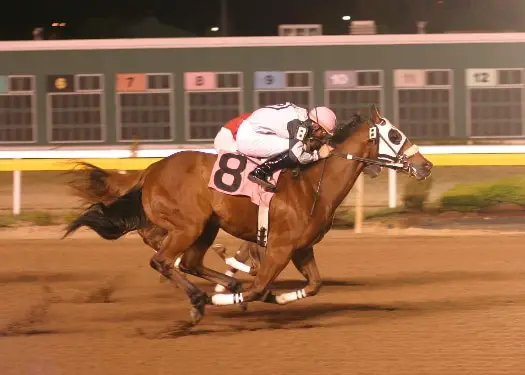
By Gambrusky at en.wikipedia
“I followed the basic strategy of work with everything. Hard work will get you to a lot of places. And I was known for being a hard worker in the mornings helping the trainers. I also had an athletic background. All of this equated into my success,” Carter said. He was a wrestler in high school, even winning State as a senior. He was also a gymnast pursuing that discipline from grade school until his early teens. He believes that these activities, along with participating in junior rodeo prepared him with the skills he would need as a jockey. Although he does attribute these activities to his success, he admits that being on the fastest horse plays a huge role in winning. But being on the fastest horse is not a guarantee to win because the jockey can always screw it up. He added that getting to ride the fastest horse was a result of working with the trainers and being afforded the opportunity to choose what he believed to be the best horse in the race.
The horses weren’t’ the only factor in winning. Obviously, a jockey must have a particular body type to be a contender just as in any sport. Carter admitted, that it wasn’t uncommon for a jockey “to eat himself out of a job”. Carter didn’t have to battle his weight during the racing season as just staying busy and riding kept the weight off, but he would gain a few extra pounds in the winter months. He would begin to diet in early spring to reach the ideal weight of 122 pounds. Jockeys can weigh a few more pounds and still qualify, but those rider’s weights are announced before the race so betters know that those horses have a few extra pounds to carry than other horses and so the odds of winning go down.
“I have been a horseman my whole life. I was raised around them and will love them my whole life,” Carter said. But horses are animals and at some point, a jockey is going to get hurt, he explained. The most common injury is a broken collar bone. When a horse goes down, the jockey is thrust forward and will most likely land on their shoulder during the unintentional dismount. Carter is no exception. He is a member of the broken collarbone club and has chipped his wrist bone, as well. However, he has fewer injuries than most who have raced less time. He attributes this to his training in gymnastics and how it taught him to take a fall with the least amount of possibility for injury. The national union for jockeys known as the Jockey’s Guild has been keeping records and statistics since its inception in 1940. Carter said that on average two jockeys are killed each year, according to the Guild’s records. Everyone he tells this statistic to is always shocked because most people don’t equate horse racing as a dangerous sport.
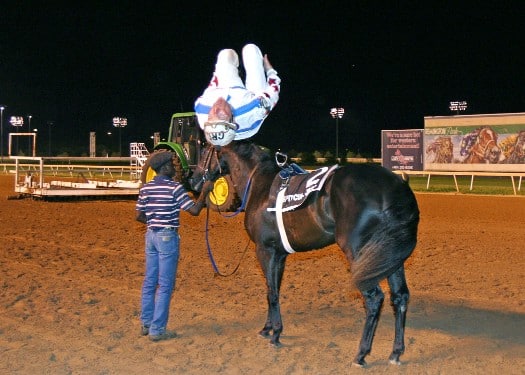
By Gambrusky at en.wikipedia
The fear jockeys have after an injury can often be a career-ending fear. Carter explained that he has known jockeys who will begin to ride with a timid caution after returning from an injury and they are not the same as before. He said in order to be good and win, a jockey can’t be scared. Carter feels that he was able to race for 35 years because he was never seriously injured and away from the track for an extended period of time. Some of the jockeys with serious leg breaks can be away for months due to the severity of their injuries. He added that some jockeys will even quit after an accident because they become worried about what an injury or their possible death would do to their families.
Win, Place or Show
Carter primarily raced the circuits in Oklahoma, Texas, New Mexico and California. These are where the quality “big money” quarter horse races are in the US, Carter said. Speaking of big money, Carter won the All-American Futurity, the Kentucky Derby equivalent for American Quarter Horse racehorses, in 1998 and in 2008. Each of those victories was awarded $1.5 million. The winning jockey pockets ten percent of those winnings. Carter explained that winning this is the dream of all quarter horse jockeys and once he won it, he felt as though he had achieved what he set out to do. He even remembers the horse’s name, Fallinginloveagain.
“After winning that race in 1998, I felt that if my career ended the next day, I had accomplished everything I wanted to in racing,” Carter said. However, his career did not end. He would go on to complete a career with 3,906 quarter horse race wins with total winnings of $80 million to become the top earner in AQHA (American Quarter Horse Association) history. Over a professional career spanning 30 years, he would walk away with ten percent of those winnings. The next closest earner was at $48 million at the time of his retirement. In addition, he won the AQHA Champion Jockey Award ten times, twice that of any other jockey.
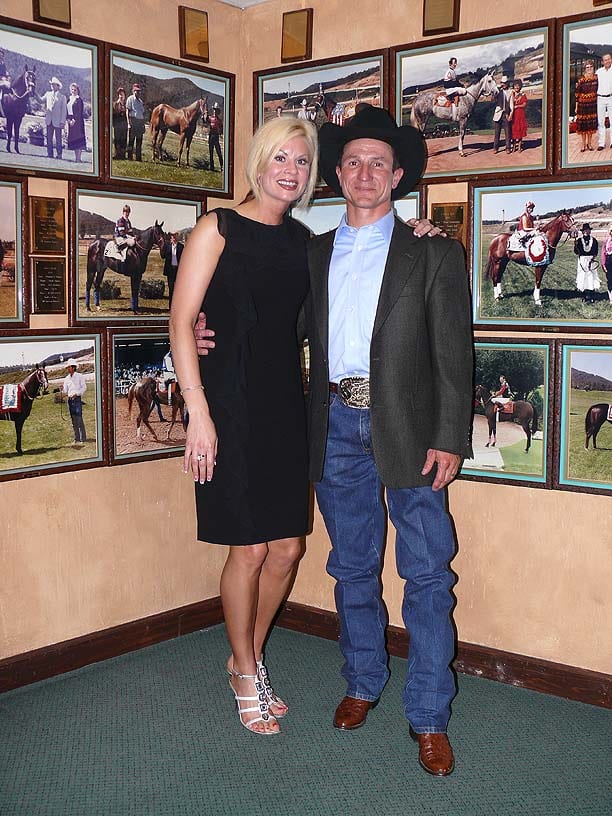
He retired at the end of 2018, but he ended on a high note. Carter jockeyed his last race on December 16 of that year and finished with a $2 million win. It was a “story book ending” he said. Carter spends his time now at his home in Oklahoma City with his wife Shaena, participating in the senior rodeos and taking care of his horses.
“It’s pretty cool that I got to spend my adult life around horses and to have the excitement of racing and the thrill of winning on a daily basis. I feel pretty lucky to have been able to do that and make a good living at it. I am truly blessed,” Carter said.
Interesting Fact: Quarter horses reach top speeds of 55-57 mph.

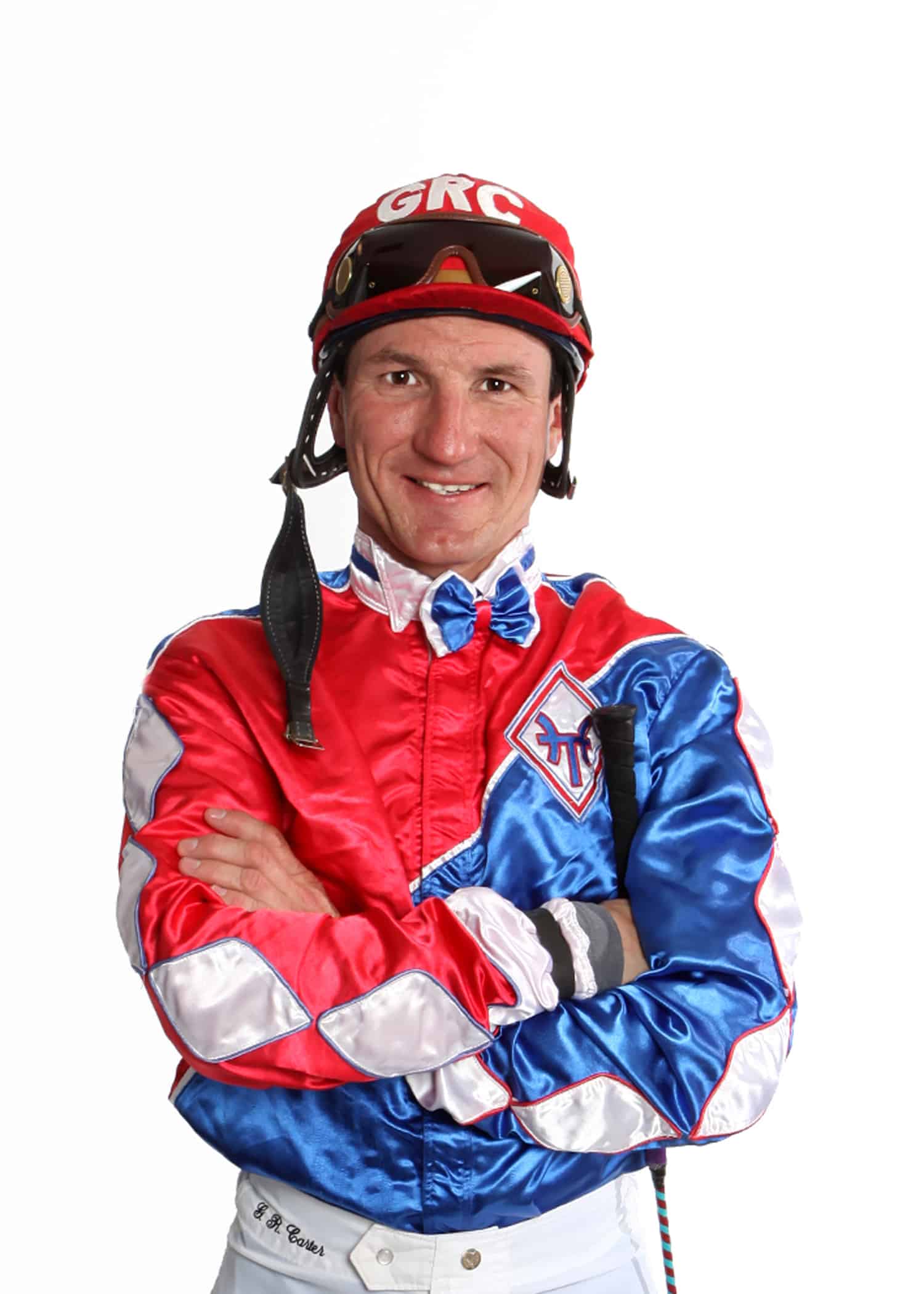


0 Comments